March 19th, 2015 by iisg_superadmin
Allison Neubauer and Kirsten Walker were at the University of Illinois Public Engagement Symposium last week to raise awareness of IISG outreach in Champaign-Urbana. Allison had this to say about the event.
The public engagement symposium was a great opportunity to find out what other local organizations and academic programs are working on. The crowds of people—both those staffing booths and walking through and exploring—were a true testament to Champaign-Urbana’s widespread effort to get involved and take collective action on local initiatives.
Our IISG table generated a lot of traffic. With spring on the horizon, many visitors were excited to learn about our mobile walking tour of downtown Chicago. Others stopped to discuss invasive species and ways they can help halt their spread.
 But the biggest draw was our university Learning in Community (LINC) course poster, created by undergraduate students enrolled in our section last fall. These students focused on increasing awareness on campus about how pharmaceuticals contaminate our waterways. They also coordinated a take-back event for students and community members to properly dispose of their unwanted medication. The event was a big success, collecting 15 pounds of unused medicine for incineration in just six hours.
But the biggest draw was our university Learning in Community (LINC) course poster, created by undergraduate students enrolled in our section last fall. These students focused on increasing awareness on campus about how pharmaceuticals contaminate our waterways. They also coordinated a take-back event for students and community members to properly dispose of their unwanted medication. The event was a big success, collecting 15 pounds of unused medicine for incineration in just six hours.
For Kirsten and I, what was particularly exciting and unique about this symposium was our ability to connect with others working locally on related problems. For example, a Champaign community health center invited us to discuss pharmaceutical disposal with their patients. There was also a UIUC engineering student interested in the homemade filtration system our LINC students created with local high schoolers to show how some contaminants can slip through wastewater treatment processes. She is currently working to design and implement a water system and health program in a rural Honduran community and was looking for ways to engage with local residents.
January 27th, 2015 by iisg_superadmin
Managing aquatic invasive species is no easy—or cheap—task. Plants and animals spread to new regions through a variety of routes, many of which involve human activities like fishing, boating, and gardening. Coupled with the fact that there are hundreds of new species poised to thrive in Midwestern environments, it is very difficult for natural resource managers to get a jump on these invaders.
But all that may be changing in Illinois due to a new database cataloging the presence of non-native species across the state. Created at Loyola University Chicago by then-graduate student Abigail Jacobs and ecologist Reuben Keller, the database brings together animal and plant sightings collected by the U.S. Geological Survey, Field Museum, Illinois Natural History Survey, and many other organizations and researchers. Its more than 20,000 records makes it one of the most comprehensive AIS databases in country.
The size and detail of the database reveals previously-unknown patterns in the movement of invasive species that will help natural resource managers better focus their control and monitoring efforts.
“We now have maps showing the number of AIS in each county and showing where species tend to be first recorded,” said Keller. “These are really useful for determining where managers should focus on controlling existing invaders and where efforts should go into monitoring for new invaders.”
These maps and other analysis results are expected to be included in the updated Illinois State Comprehensive Management Plan for Aquatic Nuisance Species. First written in 1999, in part by IISG’s Pat Charlebois, the plan identifies invasive species that pose the greatest threat to the state and provides guidance for organizations working to halt their spread.
“The database will make it easier to connect with audiences by talking about how the specific waterways and habitats they care about are being affected by invasive species,” said Pat.
***Photo: Purple loosestrife is one of many invasive plants cataloged in the database.
September 17th, 2014 by iisg_superadmin
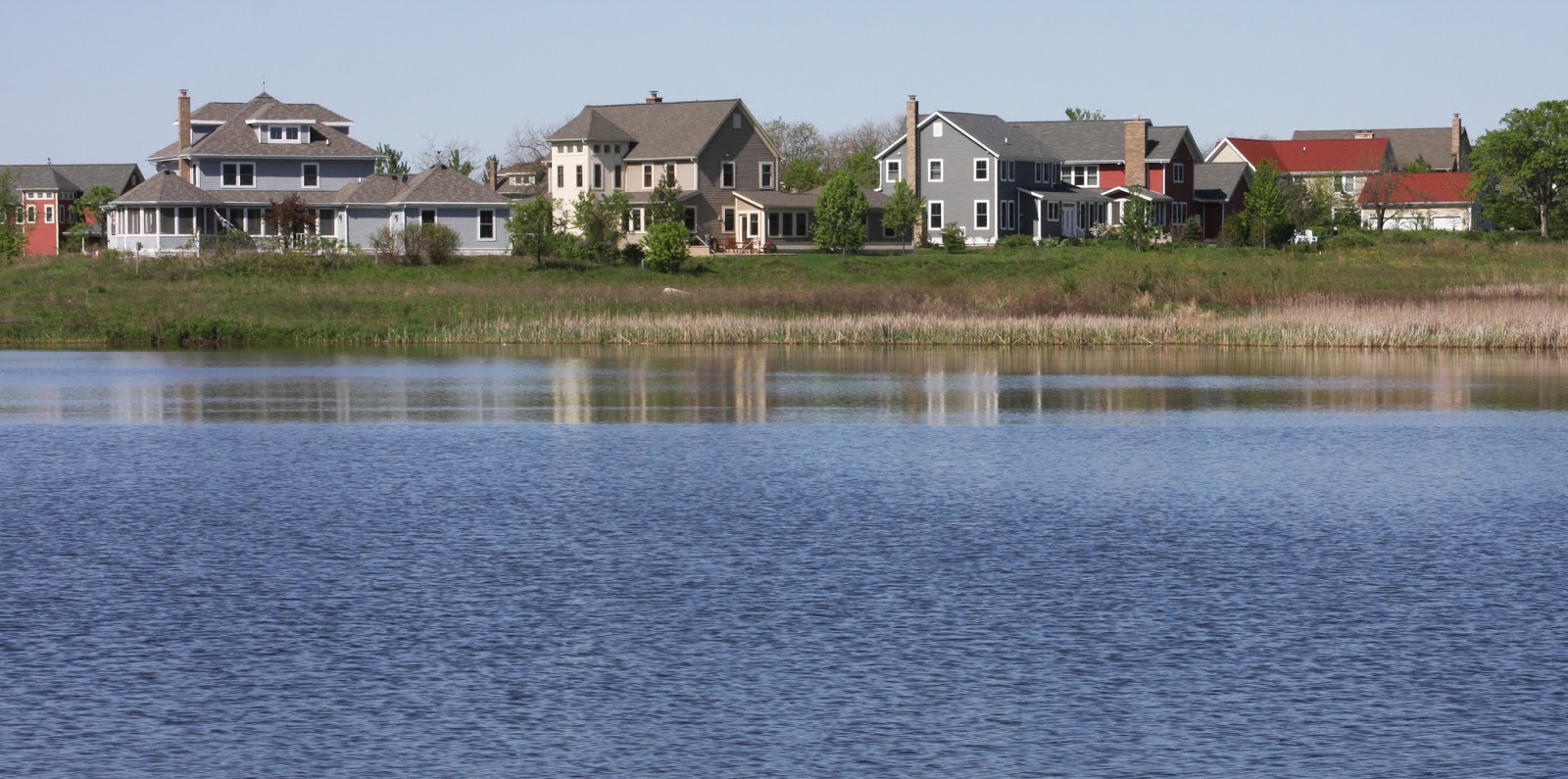 Lawn care decisions play a large role in local water quality and the health of aquatic wildlife. The fertilizers, pesticides, and other chemicals we put on our lawns can be washed into nearby lakes and rivers in stormwater runoff. Once there, these pollutants spur algae growth, clog gills, decrease resistance to disease, and suffocate eggs and newly hatched larvae.
Lawn care decisions play a large role in local water quality and the health of aquatic wildlife. The fertilizers, pesticides, and other chemicals we put on our lawns can be washed into nearby lakes and rivers in stormwater runoff. Once there, these pollutants spur algae growth, clog gills, decrease resistance to disease, and suffocate eggs and newly hatched larvae.
The IISG-led Lawn to Lake program continues to educate homeowners, landscapers, and master gardeners on natural lawn care practices that can improve soil health and protect water quality. The program works with community partners across the region to conduct training workshops and provide ‘how to’ resources for a range of audiences.
Lawn to Lake outreach has led to management changes on an estimated 22,415 lawn acres. These changes are expected to reduce the use of lawn care chemicals, including weed and feed, by more than 3 million pounds a year, protecting nearby aquatic ecosystems from chemical-laden runoff while fostering healthy lawns.
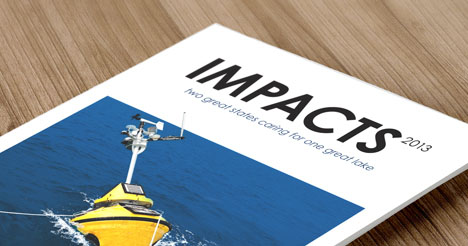 To learn more about how IISG is empowering communities and individuals to secure a healthy environment, check out our 2013 program impacts.
To learn more about how IISG is empowering communities and individuals to secure a healthy environment, check out our 2013 program impacts.
August 29th, 2014 by iisg_superadmin
 Our summer internship program has wrapped up for another year. This summer, seven students and recent graduates worked with our specialists on broad range of issues, including AIS prevention, sediment remediation, and water supply planning. Brittany Sievers spent her internship working with Kara Salazar, IISG’s sustainable communities specialist. She had this to say about her summer experiences:
Our summer internship program has wrapped up for another year. This summer, seven students and recent graduates worked with our specialists on broad range of issues, including AIS prevention, sediment remediation, and water supply planning. Brittany Sievers spent her internship working with Kara Salazar, IISG’s sustainable communities specialist. She had this to say about her summer experiences:
“Since my internship covered many programs, I worked on different projects every day, which kept me busy and engaged. Some of my favorite projects were those that gave me an opportunity to develop my professional writing skills and become a published author. I wrote several curriculum pieces for the Enhancing Public Spaces program and pieces that will appear on the program’s website once it is complete. I expanded the Green Meetings and Events Planning Guide that a previous intern created by adding ‘cheat sheets’ for large events and professional meetings that summarized the information provided within the publication. Finally, I wrote scripts for two rainscaping training videos—plant selection and rain garden design.

I was also able to get out of the office and work directly with the public and other key stakeholders on several occasions. I was at the Wabash Riverfest with a trivia game geared towards children that I developed. I also assisted Kara during pilot testing of the Tipping Points and Indicators tool in Hobart, IN and with a presentation of the program during the 2014 Institute for Sustainable Development in Nashville, IN.
Since I plan to work in an outreach position in the future, this internship was perfect for me. I had not had work experience in outreach before, but I have enjoyed being active in several outreach clubs at Purdue to facilitate positive change on the Purdue University campus and the surrounding community. I know my experiences this summer will help my chances of landing a job and excelling in that position in the future.”
With her undergraduate work in natural resources and environmental sciences complete, Brittany is turning her sights to graduate school. In fact, she began work on a Master’s in marine conservation and policy earlier this week at Stony Brook University in New York.
April 29th, 2014 by iisg_superadmin
The North Central Region Water Network is a recently formed partnership between extension agencies and professionals in twelve states. The network was created to help foster collaboration between researchers and extension staff throughout these states addressing water issues common to the region.
The Current, a webinar series designed to connect people with the new network and the water issues that are critical to the region, held the first round of presentations earlier this month. IISG’s water resource economist Margaret Schneeman was among the presenters for the inaugural webinar, Managing Water Supply: Resources for Education, Engagement, and Research, and she highlighted the work done so far to address water supply planning in northeastern Illinois. Gary Zoubek of the University of Nebraska-Lincoln Extension, and David Lusch from Michigan State University presented for the webinar as well.
Through both the webinars and collaboration between extension programs, the North Central Region Water Network hopes to expand water protection efforts, research, and the spread of information throughout the states. Visit the webpage (linked above) to learn more.
April 8th, 2014 by iisg_superadmin
The IISG aquatic invasive species team (AIS) kicked off their fishing tournament season with a bang earlier this week. Several members were onsite April 6 for a high school bass fishing tournament to talk with young anglers about the threat of AIS and what they can do to prevent their spread. Hosted by the Illini Bass Fishing Club, the third annual High School Open drew a record number of teams and anglers to central Illinois’ Clinton Lake.
IISG science writer Anjanette Riley joined the AIS team for the tournament and recalls the day’s events:
“If every fishing tournament this year was like the High School Open, this will be a great year for AIS outreach. During the couple hours we were onsite, Sarah Zack and Alice Denny talked with hundreds of anglers, coachers, and on-lookers from Illinois and Wisconsin.
But more than the numbers, what really made Sunday a success was people’s enthusiasm. Groups huddled around the IISG table to talk about Sea Grant, invasive species, and three easy steps to ensure invaders can’t hitch a ride to new waterbodies: remove, drain, dry. Many of these coaches said they would take the message—and the Stop Aquatic Hitchhikers giveaways—back to team members not competing that day. And frequent announcements from Luke Stoner, the Illini club president, reminded the crowd of the risks AIS pose to their sport and the importance of “leaving the lakes better than we found them.”
The day also proved successful for many of the anglers fighting to catch the most and biggest bass. The fish were hesitant to bite, but more than half of the 79 competing teams weighed in at least one. Several teams brought in bags of fish weighing more than 6 lbs. The winning duo, though, sealed their victory with two fish weighing in at 8.3lbs, and the Big Bass award went to an Edinburg-South Fork student who caught a 6.46lb largemouth bass—a true “Clinton Lake slaunch.”
These hard-working high school anglers have a full season of fishing in front of them. In fact, for many of the teams, Sunday was their first day on the water this year. And their successes at the tournament will help them qualify to compete in sectional and state competitions.
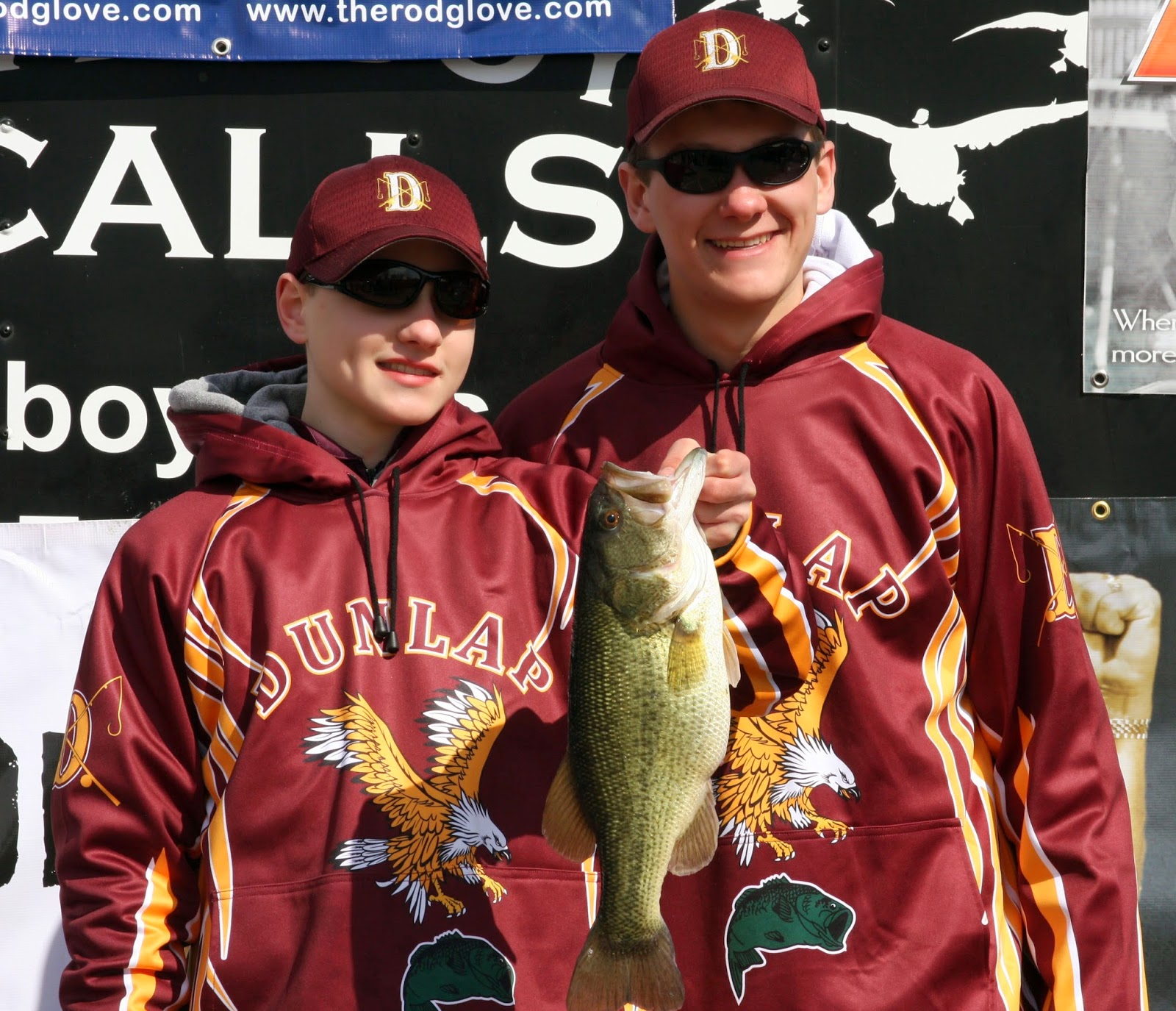 Sunday was the first of many tournaments for IISG’s AIS outreach team as well. Sarah, Alice, and others will take their message of prevention to professional and amateur tournaments across Illinois and Indiana this spring. But the annual High School Open marked a rare and important opportunity to talk with young anglers about the importance of curbing the spread of AIS.”
Sunday was the first of many tournaments for IISG’s AIS outreach team as well. Sarah, Alice, and others will take their message of prevention to professional and amateur tournaments across Illinois and Indiana this spring. But the annual High School Open marked a rare and important opportunity to talk with young anglers about the importance of curbing the spread of AIS.”
To learn more about AIS, visit the IISG website. And watch for our “Be a Hero – Transport Zero” campaign this summer with how-to information on basic steps to take before leaving a marina or boat ramp.
February 7th, 2014 by iisg_superadmin
From UnwantedMeds.org
Last week’s trip to Indianapolis for the annual Indiana Veterinary Medical Association conference was not a typical event for IISG. The three-day conference gave Laura Kammin a unique opportunity to talk with students before they begin their careers as veterinarians or veterinary technicians about the importance of properly disposing of unwanted medication.
“It’s becoming a rarity for me to chat with a veterinarian who doesn’t know about the environmental impacts of improper medicine disposal,” said Laura. “The next step for IISG is to make sure that students are aware of the need for proper storage and disposal.”
Many of the students were unfamiliar with the topic or the disposal options available in their communities. Laura introduced them to simple steps for managing pharmaceuticals in clinics and talked about how they can help spread the word about proper disposal to their future clients.
 The event is one of several Laura has attended in the last few years to share resources and speak directly with veterinarians about pharmaceutical stewardship. It is all part of a partnership between IISG and the American Veterinary Medical Association (AVMA). Since they joined forces in 2011, IISG and AVMA have developed brochures, public service announcements, and other materials for veterinaries to share with their clients.
The event is one of several Laura has attended in the last few years to share resources and speak directly with veterinarians about pharmaceutical stewardship. It is all part of a partnership between IISG and the American Veterinary Medical Association (AVMA). Since they joined forces in 2011, IISG and AVMA have developed brochures, public service announcements, and other materials for veterinaries to share with their clients.
Many of these materials have been tailored to small animal veterinarians—those who work with dogs, cats, and other household pets. Now, though, IISG and AVMA are turning their sights towards livestock and the vets who care for them. Antibiotics and other pharmaceuticals used to treat livestock have been found in waterways across the country. In fact, animal agriculture is often the primary contributor of pharmaceutical pollution in rural areas, and some of these chemicals have been linked to impaired development and reproduction in aquatic wildlife.
The transition to livestock pharmaceuticals took a big step forward during the conference thanks to an opportune meeting with Dan Walsh, a distance learning instructor at the Purdue College of Veterinary Medicine. Laura and Dan traded resources that will help both programs strengthen their efforts to educate future vets and vet techs about the importance of proper medicine storage, use, and disposal.
November 15th, 2013 by Irene Miles
The 3rd Annual Great Lakes Place-based Education Conference, November 7-9 in Grand Rapids, Michigan, brought together over 200 teachers, community representatives, non-profit organization educators, and more. The conference gives teachers an opportunity to incorporate the latest place-based research and education concepts about the Great Lakes into their lessons, encouraging student stewardship, continuing science education, and community development.
 IISG’s Robin Goettel attended the conference and organized a poster session, “Center for Great Lakes Literacy: Connecting Educators, Scientists and Citizens.” The Center for Great Lakes Literacy (CGLL) “engages educators, students, scientists, and lifelong learners in stewardship and citizen science activities to help protect and restore Great Lakes watersheds.”
IISG’s Robin Goettel attended the conference and organized a poster session, “Center for Great Lakes Literacy: Connecting Educators, Scientists and Citizens.” The Center for Great Lakes Literacy (CGLL) “engages educators, students, scientists, and lifelong learners in stewardship and citizen science activities to help protect and restore Great Lakes watersheds.”
According to Robin, “A major focus of this exhibit was creating awareness of Great Lakes Literacy Principles – a great foundation from which to create an environmental stewardship ethic. CGLL specialists shared exciting educator opportunities including ship-based and shoreline workshops focusing on the latest Great Lakes issues. Visitors learned about water quality monitoring equipment they can use with their students made available courtesy of the USEPA GLNPO Limno Loan program. Participants also found out about Great Lakes Awareness Days that will be offered throughout the region.”
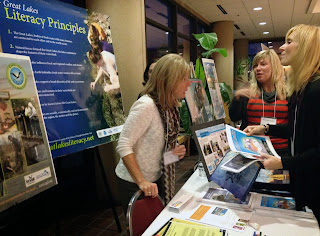 Representatives of the CGLL program from seven Great Lakes Sea Grant programs were on hand to talk with attendees about the wide array of resources available, many specifically tailored to the environmental needs and issues of their region. Classroom resources were also available, including Fresh and Salt and Greatest of the Great Lakes curricula, as well as the Dose of Reality newspaper activity guide that covers the disposal of unwanted medicines and personal care products.
Representatives of the CGLL program from seven Great Lakes Sea Grant programs were on hand to talk with attendees about the wide array of resources available, many specifically tailored to the environmental needs and issues of their region. Classroom resources were also available, including Fresh and Salt and Greatest of the Great Lakes curricula, as well as the Dose of Reality newspaper activity guide that covers the disposal of unwanted medicines and personal care products.
November 12th, 2013 by Irene Miles
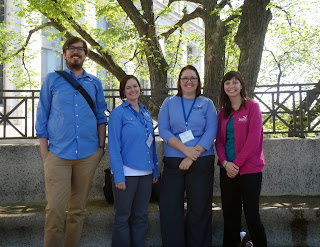 Staff members from 20 different Sea Grant programs across the U.S. attended two Sea Grant Academy sessions this year (one week in April, and one in October). The academy was developed to give Sea Grant employees valuable training and professional development information in a variety of fields, benefiting their work and the work of all Sea Grant programs at large.
Staff members from 20 different Sea Grant programs across the U.S. attended two Sea Grant Academy sessions this year (one week in April, and one in October). The academy was developed to give Sea Grant employees valuable training and professional development information in a variety of fields, benefiting their work and the work of all Sea Grant programs at large.
Five staff members from Illinois-Indiana Sea Grant were able to attend, and participated in sessions ranging from the history of Sea Grant to project design and evaluation, social science training, time management, communicating the importance of ocean science to various audiences, and much more.
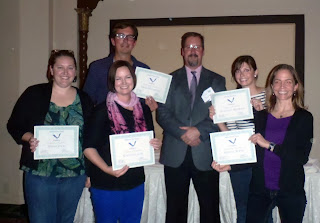 IISG’s Danielle Hilbrich, Greg Hitzroth, Kristin TePas, Kara Salazar, and Sarah Zack were among the more than 40 Sea Grant professionals who completed both weeks of training and graduated from Sea Grant Academy with new information and skills to bring to their work protecting the Great Lakes.
IISG’s Danielle Hilbrich, Greg Hitzroth, Kristin TePas, Kara Salazar, and Sarah Zack were among the more than 40 Sea Grant professionals who completed both weeks of training and graduated from Sea Grant Academy with new information and skills to bring to their work protecting the Great Lakes.
“Sea Grant Academy was a really unique opportunity to meet people from around the country that are working on the same issues we are,” said Sarah. “I thought that it was a great way to foster both partnerships between programs and friendships between specialists. I really enjoyed meeting all the attendees and hearing all about the great work they’re doing.”
 And Kristin TePas wrote, “It was a great opportunity to connect with other Sea Grant specialists from around the country. Also, hosting the meeting in Duluth provided a great opportunity to showcase our freshwater coast and the issues surrounding the Great Lakes.”
And Kristin TePas wrote, “It was a great opportunity to connect with other Sea Grant specialists from around the country. Also, hosting the meeting in Duluth provided a great opportunity to showcase our freshwater coast and the issues surrounding the Great Lakes.”
To learn more about the National Sea Grant program and the work being done to protect America’s coastal resources, visit the NOAA Sea Grant webpage.
 But the biggest draw was our university Learning in Community (LINC) course poster, created by undergraduate students enrolled in our section last fall. These students focused on increasing awareness on campus about how pharmaceuticals contaminate our waterways. They also coordinated a take-back event for students and community members to properly dispose of their unwanted medication. The event was a big success, collecting 15 pounds of unused medicine for incineration in just six hours.
But the biggest draw was our university Learning in Community (LINC) course poster, created by undergraduate students enrolled in our section last fall. These students focused on increasing awareness on campus about how pharmaceuticals contaminate our waterways. They also coordinated a take-back event for students and community members to properly dispose of their unwanted medication. The event was a big success, collecting 15 pounds of unused medicine for incineration in just six hours. 









